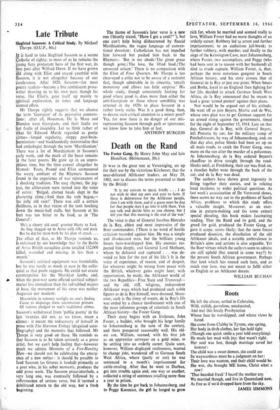a Late Tribute ca tholic of eighty; to most of us
he remains the young fiery protestant hero of the first war, its foist poet after Wilfred Owen. If we have grown 41d along with Eliot and stayed youthful with Sassoon, it is not altogether because of our carelessness. After 1920, Sassoon—for most poetry readers—became a fine reminiscent prose- writer drawing us to his own past; though his verse, like Eliot's, gave itself up mainly to ..spiritual exploration, its " tones and language deemed effete.
Mr Thorpe rightly suggests that we cleanse the term 'Georgian' of its pejorative connota- tlons : after all, Housman, De la Mare and Blunden were Georgians, and their faults are , lot faults of insipidity. Let us think rather of what Sir Edward Marsh regarded as poetic , tvirtues—limpid regularity, sloppy post-Swin- umianism—and backhandedly memorialise that ad anthologist through the term `Marshianism.' There was a lot of Marshianism in Sassoon's sarly work, and the mark of the beast remains 9 the later poems. He grew up in an unpro- pitious time, but the time cannot altogether be blamed : Yeats, Pound and Eliot surmounted the weary ambient of the Rhymers. Sassoon pound in the experience of war rejuvenators of t shocking tradition. The easy rhymes, the jog- trot, the alliteration were turned into the voice of satire : 'Bulged, clotted heads slept in the plastering slime./ And then the rain began,— the jolly old rain!' There was still a certain amillness, as in that vision of the tank lurching down the music-hall stalls, but Sassoon at his best was too bitter to be loud, as in 'The General':
`He's a cheery old card,' grunted Harry to Jack As they slogged up to Arras with rifle and pack.
But he did for them both by his plan of attack . . . The effect of that, as Mr Thorpe reminds us, Is enhanced by our knowledge that 'in the Battle of Arras British casualties alone totalled 132,000 killed, wounded and missing, in less than a month.'
Sassoon's satirical equipment was formidable, but he was rarely as much at ease in the collo- quial as that poem suggests. He could not create counterpoints for the Marshian iambs, and,
it.
When the post-war scene offered satirical subject- matter less immediate than the red-tabbed majors at base, the movement of his verse was neither Augustan nor modern:
Meanwhile in summer sunlight no one's finding Cause to disparage these unconscious provers Of nations pledged to war's traditional crimes. Sassoon's withdrawal from 'public poetry' in the late 'twenties did not, as we know, mean a ial ence : it meant the rediscovery of himself in
ioprose with The Sherston Trilogy (disguised auto- graphy) and the memoirs that followed. Mr orpe is very good on these. He reminds us that Sassoon is to be taken seriously as a prose artist, but we can't help feeling that—however t&uch we admire Memoirs of a Fox-Hunting fin—we should not be celebrating the emerg- ence of a new métier: it should be possible to laud Sassoon (as Graves is lauded) primarily as a poet who, in his sober moments, produces the odd prose work. The Sassoon prose-interlude, a very long one, was eventually followed by a rehorescence of serious verse, but irseemed a debilitated return to the old way, not' a fresh fieginning. The theme of Sassoon's later verse is a new one (`bluntly stated, "Have I got a soul?" '), but one can't help being disheartened by flaccid Marshianisms, the vague language of conven- tional devotion : Catholicism has not impelled him forward but pushed him back to the Rhymers : 'But in me abode/The given grace though gone; /The love, the lifted load,/The answered orison.' There is no comparison with the Eliot of Four Quartets. Mr Thorpe is too clear-eyed a critic not to be aware of a restraint that, though admirable in its sincerity, 'entails monotony and allows too little surprise.' His whole study, though consistently looking for good where good is, does more than either the anti-Georgians or those whose sensibility was arrested in the 1920s to place Sassoon in a rather lowly niche. Was it a good thing, then, to devote such critical attention to a minor poet? Yes, for now there is no danger of our mis- representing Sassoon through guilt or ignorance; we know how to take him at last.
ANTHONY BURGESS


































 Previous page
Previous page